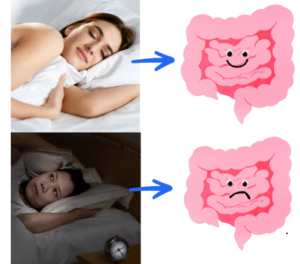Exploring the Crucial Link Between Quality Sleep and Optimal Digestive Health
Sleep is not merely a period of rest; it is an essential biological process that significantly influences our digestive health. The complex interplay between sleep and digestion involves a variety of physiological functions that collaborate harmoniously. The body's circadian rhythm, commonly referred to as the internal body clock, aligns both sleep patterns and digestive processes. This synchronisation is evident in how people typically experience hunger at regular intervals throughout the day, highlighting the body's remarkable ability to operate in accordance with natural biological cycles.
The Essential Role of Quality Sleep in Supporting Digestive Health 
Sleep plays an indispensable role in the body's capacity to heal, rejuvenate, and restore its various systems. Particularly during the deeper stages of sleep, the body engages in critical restorative processes. In these profound stages, the organs, tissues, and cells that make up the digestive system not only relax but also activate essential repair mechanisms. The body emphasises cellular repair and growth during deep sleep, particularly in the regeneration of cells lining the digestive tract. These cells face continuous wear and tear from food particles and digestive enzymes, making their renewal vital to maintaining the integrity of the gastrointestinal lining, thereby enhancing the overall effectiveness of digestion.
Deep sleep also plays a pivotal role in fortifying the immune system, which is especially crucial for the digestive system. This system houses specialised immune cells that are activated by the beneficial bacteria residing in the gut. These immune cells are instrumental in protecting the gut and the entire digestive system from harmful microorganisms, thereby ensuring a balanced population of bacteria within the gut ecosystem.
Furthermore, the organs within the digestive system are essential for detoxification, facilitating the elimination of waste and harmful substances from the body. Deep sleep enhances this detoxification process by optimising the performance of the liver and kidneys, enabling these organs to function at their best. The synergistic relationship between sleep and detoxification is a critical factor in promoting overall digestive health and wellness.
Examining the Intricate Relationship Between Gut Motility and Sleep Patterns
A critical aspect of digestion involves the effective movement of food and waste throughout the digestive tract, a process known as gut motility. This process experiences significant changes during sleep. Throughout both deep and light sleep, the rate of gut motility is substantially reduced. This decrease is a necessary adaptation that allows the digestive system to conserve energy, which is then redirected towards repairing digestive tissues. By conserving energy in this manner, the digestive process is optimally prepared to function more efficiently during waking hours, thereby enhancing both nutrient absorption and waste elimination.
The migrating motor complex represents a series of contractions that occur during fasting periods, including during sleep. This cycle is crucial for gut motility, as it efficiently clears away food particles and residual matter that may remain in the digestive system. This natural cleansing mechanism of the digestive tract minimises the risks of bacterial overgrowth, promoting a healthy gut environment. Notably, the migrating motor complex is most actively engaged during the night when individuals are in a fasting state and asleep, highlighting the essential role of sleep in preserving the health of the digestive system.
As dawn approaches, gut motility begins to rise, getting the digestive system ready to efficiently process and digest food. This increase in motility can also instigate the first bowel movement of the day, exemplifying the finely tuned relationship between sleep and gut motility. Understanding this connection is vital for optimising digestive health and enhancing overall well-being.
Deciphering Hormonal Interactions That Influence Sleep and Digestive Health
Ghrelin, often referred to as the hunger hormone, plays a pivotal role in stimulating appetite, while leptin communicates to the brain that the stomach is full, helping to prevent overeating. Together, these hormones are crucial to appetite regulation; however, their functionality can be adversely affected by inadequate sleep.
Even a single night of poor sleep can result in elevated levels of ghrelin, which can subsequently increase appetite and often trigger cravings for carbohydrates. This phenomenon is frequently described as feeling ‘hangry’. To complicate matters, leptin levels may also decline after a night of insufficient sleep, disrupting the signals that indicate when one is full. This creates a challenging scenario where individuals may overindulge and struggle to recognise their body's cues to stop eating. While occasional poor sleep may not have serious consequences, chronic insomnia can lead to significant digestive complications, including gut inflammation, liver disorders, gastroesophageal reflux disease, inflammatory bowel disease, and even colorectal cancer, in addition to contributing to weight gain.
The Impact of Sleep Disruption on Digestive Health and Function
Disruptions to sleep can give rise to a variety of digestive issues. Factors such as shift work, particularly night shifts, and experiencing jet lag can significantly disrupt sleep patterns and disturb the body's internal clock. Additionally, consuming meals late at night or maintaining irregular eating schedules can adversely impact the quality of sleep. The circadian rhythm, which regulates sleep, is intrinsically linked to natural sunlight, playing a vital role in sustaining a healthy sleep-wake cycle.
Unfortunately, in today's technology-driven society, many individuals find themselves spending the majority of their daytime indoors, leading to decreased exposure to natural light. This shift has resulted in increased exposure to blue light emitted from devices like laptops, televisions, and smartphones, further disrupting the sleep cycle and sleep patterns, particularly when this exposure occurs shortly before bedtime.
The cumulative effects of these factors can lead to serious digestive issues, including diarrhoea, ulcers, inflammatory bowel disease, or imbalances between beneficial and pathogenic bacteria in the gut. Such imbalances can also undermine the integrity of the gut lining, exacerbating challenges related to digestive health.
Boosting Microbiome Health Through Quality Sleep Practices
The microbiome consists of trillions of microorganisms inhabiting the gut, primarily composed of beneficial bacteria known as probiotics, along with viruses, fungi, and potentially harmful bacteria. These microorganisms are vital not only for overall health but also for digestive health. They enhance the immune response and assist in digestion, promoting the production of specific vitamins, enzymes, hormones, and amino acids. Recent studies indicate a significant connection between the microbiome and sleep, suggesting that disrupted sleep or chronic insomnia can unfavourably affect the balance of these microbes, ultimately impacting digestive health and overall well-being.
Examining the Complex Interactions Between Microbiome Health and Sleep Quality
The relationship between sleep and microbiome health is intricate and multi-faceted. Insufficient sleep can adversely affect microbiome health, while an imbalanced microbiome can also negatively influence sleep quality. To comprehend this complex relationship, one study indicated a correlation between a higher abundance of certain bacterial types in the gut and quicker sleep onset, as well as fewer night awakenings. While this article cannot cover all findings, the key takeaway is that fostering a diverse and thriving population of beneficial bacteria in the gut is essential for achieving optimal sleep, effective digestion, and overall health maintenance.
Exploring the Connections Between Stress, Sleep, and Digestive Well-being
A common consequence of stress and anxiety is disrupted sleep. Conversely, these mental health challenges can also detrimentally affect the physical health and functionality of the digestive system. Such disruptions can lead to altered gut motility and contribute to complications like indigestion, ulcers, and irritable bowel syndrome. A significant factor in this dynamic is the influence of the so-called stress hormone, cortisol.
Understanding the Impact of Cortisol on Digestive Processes
When cortisol levels rise, the body activates a fight-or-flight response. This physiological reaction redirects blood flow to essential areas such as the heart, brain, lungs, and muscles, while diminishing flow to the digestive system. This response prepares the individual to either confront danger or flee, a reaction that was critical for survival in ancient environments.
In contemporary settings, however, stressors are often less life-threatening, including financial pressures, work-related stress, or inadequate sleep. While the short-term redirection of blood flow may be beneficial in acute situations, chronic stress can yield detrimental effects on the digestive system, particularly regarding gut motility. This can result in symptoms such as constipation, diarrhoea, indigestion, gas, and bloating. Thus, implementing effective stress management techniques is crucial for supporting both gut health and achieving restorative sleep.
Ensuring adequate sleep is vital for sustaining a healthy digestive system, as the relationship between sleep and digestion is inherently interconnected. Prioritising effective sleep hygiene practices is essential for achieving restorative sleep. This encompasses reducing exposure to blue light from electronic devices, maintaining a consistent sleep schedule, creating a cool, dark sleeping environment, refraining from food intake within two hours before bedtime, and ensuring ample exposure to natural light during the day, particularly in the morning.
References
Understanding Digestive Health and Circadian Rhythms
Exploring Sleep Dysfunction and Digestive Conditions
Examining the Link Between the Gut Microbiome and Sleep
Investigating Stress and Its Effects on the Digestive System
The Article: How Sleep Affects Your Digestive System appeared first on https://janestevensnutrition.com
The Article: Sleep’s Impact on Your Digestive System Explained appeared first on https://janestevens.net
The Article Sleep’s Impact on Digestive Health Explained Was Found On https://limitsofstrategy.com
The Article Sleep’s Impact on Digestive Health Uncovered found first on https://electroquench.com
